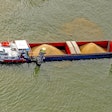
The Port of Kalama, Washington, is poised for a significant upgrade to its rail infrastructure, thanks to a $26.3 million grant from the U.S. Department of Transportation's Federal Rail Administration (FRA). Announced on Friday, this funding will support the TEMCO Rail Expansion Project, a initiative aimed at enhancing the port's grain export capabilities and efficiency.
The project will add over 25,000 linear feet of new tracks to the Port of Kalama rail system, a move expected to increase the loading efficiency of the TEMCO grain terminal by 25-30 percent. This expansion will enable continuous ship loading without the current 7-hour delay caused by repositioning inbound rail cars, streamlining the process of transferring grain directly from rail to ship.
Randy Sweet, Port Commission President, expressed gratitude for the federal support, acknowledging the efforts of Senators Patty Murray and Maria Cantwell, as well as Representative Marie Gluesenkamp-Perez in securing this crucial infrastructure investment for Southwest Washington.
The TEMCO facility, a joint venture between agricultural giants CHS and Cargill, is a key player in exporting feed grains, oilseeds, and wheat to Asia-Pacific markets. Employing 125 people in Kalama, the expansion project is expected to not only boost operational efficiency but also contribute to the local economy and job market.
This federal grant is seen as a strategic investment that will further cement the Port of Kalama's status as the top volume exporter in the Pacific Northwest. The port officials are eager to collaborate with TEMCO partners and the Federal Rail Administration to bring this project to fruition, anticipating benefits that will ripple through the regional and national economy.
As global demand for American agricultural products continues to grow, infrastructure improvements like the TEMCO Rail Expansion Project play a crucial role in maintaining the competitiveness of U.S. exports in international markets. The Port of Kalama's enhanced capabilities will likely have far-reaching impacts on the grain export supply chain, benefiting American farmers and strengthening the country's position in global trade.


















